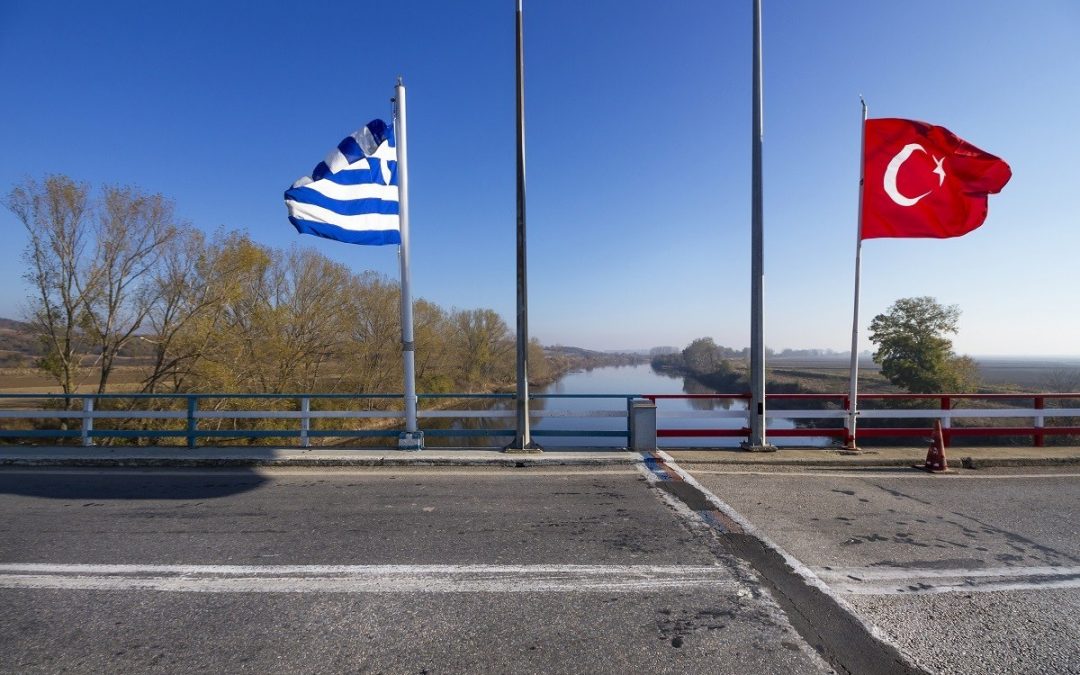A group of Turkish political asylum seekers claims that, following their attempt to cross the Turkish border via Evros River in the northeast of Greece on Friday evening, they were pushed back after being beaten by masked men with batons.
Tugba Ozkan, a journalist in the group, told IPA News on the phone that the group of 15 people fleeing persecution in Turkey crossed the Turkish-Greek border on Friday at 9 pm near Soufli, a town at Evros Regional Unit.
When they stepped on Greek soil, however, she said a group of masked men beat them and pushed them back across the river to Turkish land, where a post-coup crackdown has persecuted tens of thousands of Turkish nationals since the abortive coup in 2016.
A family of four from the group, including two children, disappeared after the alleged push-back. Turkish soldiers reportedly arrested the four Turkish nationals, Alpay Akinci (42), Meral Akinci (40), Okan Selim Akinci (11), and Ayse Hilal Akinci (8).
Trying to hide from Turkish security officers, 11 people, including Ozkan, were attempting to cross the border for the second time.
“Masked men beat us with batons. We are in a very dire situation. We are afraid to be pushed back again. We need help,” a desperate Ozkan said in dismay.
The group of asylum seekers managed to cross the Evros safely in their second attempt, she said, and the group was attempting to hide when two Greek police cars found them.
Greek Police detained the group at around 2 pm on Saturday near the border and took them into custody, according to the Greek Council for Refugees (GCR), a non-governmental organization defending human rights and fighting against illegal push-backs in the region.
The group applied for asylum in Greece and are expected to be released in a few days after the official registration is done, according to GCR lawyers.
Push-back: Infamous buzzword of immigration debate glossary
The practice that notoriously became known as “push-back,” can be defined as ‘the use of force to stop asylum seekers at borders and to return them to the country from which they came.’
According to official numbers of the United Nations, thousands of asylum seekers and refugees from various nations cross the Turkish-Greek border illegally every year in an attempt to reach Europe to take refuge.
Many reported push-back incidents have occurred in recent years, but no accurate figures have been revealed yet.
One of those incidents was the case of Murat Capan, a Turkish journalist who worked for the critical Nokta magazine. According to the narrative of Hellenic League for Human Rights, Capan and a Turkish family with three children crossed the Evros river in May 2017, escaping persecution.
The Greek police took them into custody where they asked to apply for asylum. Subsequently, they were taken to a UN facility in a van.
According to the information put forth by Hellenic League, the van met with a car along the road and five masked men dressed in camouflage bound the hands of the Turkish nationals. Two of the masked men then escorted them back to the Turkish side of the border where they were handed over to Turkish soldiers.
Turkish authorities had already sentenced Capan in absentia to twenty-two and a half years in prison. Following the push-back incident, the security forces sent Capan to prison to serve his term.
Another incident included 6 Turkish asylum seekers and took place in September 2018. Two Turkish families entered Greece via Evros and as reported by a Turkish journalist in exile, Cevheri Guven, their presence in Greece can be backed by solid evidence.
One family had their two kids with them and took their photo on a roadside cafe in Alexandroupolis.
Guven shares the location and picture of the coffee where the photo above had been taken to display that the families were indeed in Greece.
The families were escorted back to Turkey after appealing for asylum by the Greek police and thrown into the water by the Turkish side, according to Guven. Turkish gendarmerie caught them after hours of walking along the road and 3 adults out of 4 in the group faced arrest.
The cases of Capan and the Yildiz family crystalize the consequences of the push-back practice, which is a widespread method apparently enforced by Greek security forces working alongside Greece’s border with Turkey, according to the work of several NGOs.
Greek NGOs, including GCR, HumanRights360, and ARSIS, released a report on the push-backpractice in December 2018.
The report, dubbed “The new normality: Continuous push-backs of third-country nationals on the Evros river,” includes testimonies of 39 people who tried to cross the Evros river to enter Greece, but who were pushed back to Turkey, often violently.
The report of the NGOs concludes that “the practice of push-backs constitutes a particularly wide-spread practice, often employing violence in the process.”
GCR, HumanRights360, and ARSIS have urged authorities to take action against the practice, which they label as “a threat to the rule of law” in Greece.
According to a 2012 ruling of the European Court of Human Rights, push-back policy breaches international law, including the Geneva Convention and the Universal Declaration of Human Rights.
International laws are clear on peoples’ rights to seek protection from persecution in other countries, and the latter is obliged to process these requests in order to avoid the risk of endangering people who have a legitimate claim to protection.
This article originally appeared in IPA News on Apr 28.
Source: Turkey Purge



